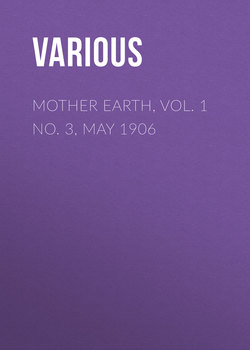Читать книгу Mother Earth, Vol. 1 No. 3, May 1906 - Various - Страница 1
TIDINGS OF MAY
ОглавлениеThe month of May is a grinning satire on the mode of living of human beings of the present day.
The May sun, with its magic warmth, gives life to so much beauty, so much value.
The dead, grayish brown of the forest and woods is transformed into a rich, intoxicating, delicate, fragrant green.
Golden sun-rays lure flowers and grass from the soil, and kiss branch and tree into blossom and bloom.
Tillers of the soil are beginning their activity with plough, shovel, rake, breaking the firm grip of grim winter upon the Earth, so that the mild spring warmth may penetrate her breast and coax into growth and maturity the seeds lying in her womb.
A great festival seems at hand for which Mother Earth has adorned herself with garments of the richest and most beautiful hues.
What does civilized humanity do with all this splendor? It speculates with it. Usurers, who gamble with the necessities of life, will take possession of Nature's gifts, of wheat and corn, fruit and flowers, and will carry on a shameless trade with them, while millions of toilers, both in country and city, will be permitted to partake of the earth's riches only in medicinal doses and at exorbitant prices.
May's generous promise to mankind, that they were to receive in abundance, is being broken and undone by the existing arrangements of society.
The Spring sends its glad tidings to man through the jubilant songs that stream from the throats of her feathered messengers. "Behold," they sing, "I have such wealth to give away, but you know not how to take. You count and bargain and weigh and measure, rather than feast at my heavily laden tables. You crawl about on the ground, bent by worry and dread, rather than drink in the free balmy air!"
The irony of May is neither cold nor hard. It contains a mild yet convincing appeal to mankind to finally break the power of the Winter not only in Nature, but in our social life,—to free itself from the hard and fixed traditions of a dead past.
